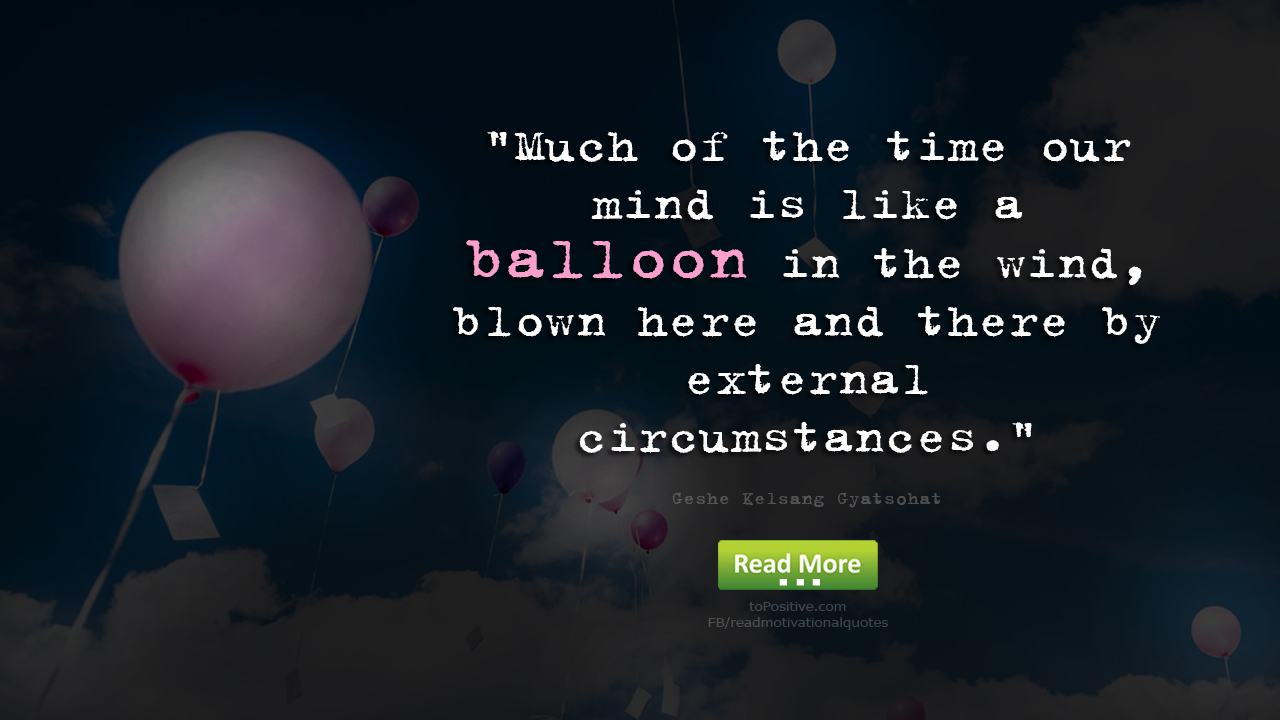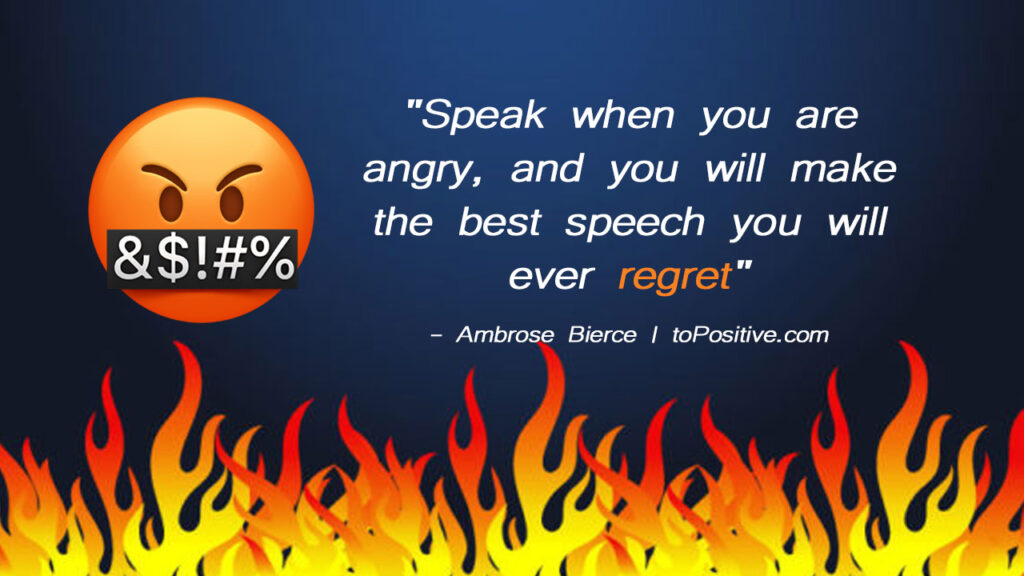Meditation is a powerful tool that can help us find inner peace by quieting the mind and allowing us to connect with our inner selves. When we meditate, we are able to let go of the thoughts and distractions that can keep us from experiencing true inner peace. Instead, we can focus on our breath, body sensations, and the present moment, allowing us to develop a greater sense of awareness and mindfulness.
Why happiness from the outside is unstable?
We all want to have a good day every day. There’s never a day when we don’t want to be happy. But whether or not we have good days or bad days depends upon how we answer the question: “Why?” Why am I having a good day? Why am I having a bad day?
“Much of the time our mind is like a balloon in the wind, blown here and there by external circumstances.” – Geshe Kelsang Gyatso.
When things are going well as our wishes, we feel happy. But then if something goes wrong, for example, “If we’re forced to work with a colleague that we don’t like” then our happy feeling disappears.
As long as our reasons for why we had a good day is a list of external conditions, then we’re not going to have stable happiness. If that’s what our joy depends upon, then our happiness will be in the hands of others because we cannot always control people and circumstances.
2 STEPS to Find Inner Peace
Stop outsourcing our happiness and unhappiness
If you wish to have a good day every day, we’ve got two things we need to do:
The first thing that we need to do is we need to stop outsourcing our happiness and unhappiness to the people and circumstances. In other words, we need to stop attributing our happiness to what’s going on externally, and we need to stop blaming others for our unhappiness.
Cultivate a source of happiness coming from inside
The second thing is to actively cultivate a source of peace and a source of happiness from inside our minds. So here’s something I want you to commit to memory: “Happiness and unhappiness are states of mind, and therefore their real causes cannot be found outside the mind.” If we have a peaceful state of mind, we will be happy regardless of people and circumstances.
If our mind is unpeaceful or agitated, then even if we have very good circumstances, we’ll find it impossible to be happy. So, in other words, it’s not what is happening that is making us happy or unhappy; It is how we are responding to those things that determine our happiness or unhappiness. Our state of mind will determine everything.
How to meditate for beginners?
How do we cultivate this stable peace of mind that we can rely upon, regardless of the external circumstances? So this is really where meditation comes into play. Meditation is the mental action of concentrating on a peaceful positive state of mind. During meditation, we concentrate on a peaceful positive state of mind, not disturbed or unhappy.
Let’s try to tap into our potential for a peaceful positive state of mind. So now, just sit comfortably, and place your feet flat on the floor, and your hands on your lap.
Prepare
- Taking a shower before meditation is not a requirement, but it can be helpful in creating a calming and relaxing environment for your practice. When you take a shower, the warm water can help soothe your muscles and relax your mind, which can help you enter a meditative state more easily. Additionally, taking a shower can help you feel fresh and clean, which can help you feel more comfortable and relaxed during your meditation practice.
- Choose a quiet, safe, and comfortable place where you can sit comfortably without any distractions. This could be a quiet corner of your home, a garden or park, or even a meditation center.
- Choose a time that works best for you to meditate, whether it’s early in the morning, during your lunch break, or before bed.
- Decide how long you want to meditate. Beginners may want to start with shorter sessions, such as 5-10 minutes, and gradually increase the time as they become more comfortable.
- Turn off your phone and any other electronic devices that may disturb your meditation. You may also want to put a “Do Not Disturb” sign outside your meditation area.
Meditate
- Sit in a comfortable cross-legged position or sit on a chair with your feet flat on the ground. Keep your back straight, shoulders relaxed, and hands resting on your knees or in your lap.
- Lightly close your eyes and become aware of the sensation of your breath, at the tip of your nose.
- As you breathe out, you can imagine you’re breathing out any agitation, mental busyness, frustration, or unhappiness in your life. Breathing it all out, like dark smoke.
- As you breathe in, you can imagine and believe that you’re breathing in a clear, bright light, which is a very nature of inner peace. You can imagine that this light fills your entire body and mind.
- For a few seconds, enjoy this inner peace coming from within.
3 Notes for meditation
Meditation is a powerful practice that can help you reduce stress, improve focus, and find inner happiness. Here are some important notes to keep in mind as you begin your meditation practice:
Consistency is key:
Try to practice meditation on a regular basis, even if it’s just for a few minutes each day. Over time, you’ll start to notice the benefits of regular practice.
1. Focus on your breath:
Your breath is the anchor for your meditation practice. Try to focus on your breath as you inhale and exhale, and allow your thoughts to come and go without judgment.
2. Don’t force it:
Meditation is a practice of letting go, so try not to force anything. If you find your mind wandering, simply bring your focus back to your breath and start again.
3. Be patient:
Meditation takes time and practice, so be patient with yourself. Don’t expect immediate results, but trust that with consistent practice, you’ll start to see the benefits over time.
Remember, meditation is a personal practice, and what works for one person may not work for another. Be open to experimenting with different techniques and find what feels best for you.
10 Famous Quotes about Inner Peace that you need to know
“Peace is not the absence of conflict, but the ability to cope with it.” – Unknown
True peace is not the absence of conflict, but rather the ability to deal with it in a calm and positive manner. Conflict is a natural part of life, and it is impossible to avoid it completely. However, one can learn to manage and cope with conflict effectively without resorting to violence or aggression. In other words, true peace is not achieved by avoiding or suppressing conflict, but by learning to deal with it constructively. When a person is able to cope with conflict in a peaceful and productive way, they are able to maintain a sense of inner peace, even in the midst of difficult situations.
“Inner peace begins the moment you choose not to allow another person or event to control your emotions.” – Unknown
The key to achieving inner peace is to take control of one’s own emotions and not allow external factors such as other people’s actions or events to dictate one’s emotional state. It emphasizes the importance of personal responsibility and the power of choice in achieving a state of inner peace. This quote suggests that inner peace is not dependent on external circumstances but rather on an individual’s inner state of being. When we allow others to control our emotions, we give away our power and become reactive instead of proactive. To achieve inner peace, we must learn to take control of our emotions and choose how we respond to external factors.
“If there is to be peace in the world, there must be peace in the nations. If there is to be peace in the nations, there must be peace in the cities. If there is to be peace in the cities, there must be peace between neighbors. If there is to be peace between neighbors, there must be peace in the home. If there is to be peace in the home, there must be peace in the heart.” – Lao Tzu
Peace is not just an external reality but also a state of mind and heart. Each of us has a role to play in creating a peaceful world. It emphasizes the importance of taking responsibility for our own actions and cultivating peace within ourselves and our immediate surroundings. By doing so, we can contribute to a more peaceful world, one that is based on empathy, understanding, and mutual respect.
“The measure of success is happiness and peace of mind.” – Bobby Davro
True success is not just about achieving external accomplishments, but also about experiencing a sense of inner fulfillment and well-being. Happiness and peace of mind are more important indicators of success than material wealth, power, or fame.
It challenges the notion that success is solely based on external achievements such as career success, financial prosperity, or social status. Instead, it suggests that true success is achieved when we are able to find meaning and purpose in our lives, feel content with who we are, and experience a sense of peace and happiness.
“The greatest weapon against stress is our ability to choose one thought over another.” – William James
We have the power to control our thoughts and choose how we respond to stressful situations.
Stressful situations are a part of life, but how we choose to think about them can make a significant difference in how we feel and respond. When we choose to focus on negative thoughts, we tend to experience more stress and anxiety. However, when we choose to focus on positive thoughts and find solutions to problems, we can feel more in control and experience less stress.
“Peace is not something you wish for; it’s something you make, something you do, something you are, and something you give away.” – John Lennon
Peace is not just a passive state of being, but an active choice and a conscious effort that we must make in our daily lives. Peace is a way of being, a state of mind and heart that we cultivate through our thoughts, words, and actions.
We can contribute to creating a peaceful world by being a positive influence in the lives of those around us. By showing compassion, empathy, and kindness towards others, we can create a ripple effect of peace and contribute to a more harmonious world.
“The pursuit of inner peace is more important than the search for happiness or success.” – Unknown
While happiness and success are desirable goals, they can only be fully enjoyed and sustained if we have inner peace. The pursuit of happiness and success can often be driven by external factors such as wealth, power, or status. However, these external factors are often transient and can lead to temporary happiness. Inner peace, on the other hand, is a state of being that comes from within and is not dependent on external circumstances.
“The only way to find true inner peace is to live in the present moment. Let go of the past and don’t worry about the future.” – Unknown
Often, we get caught up in regrets and grievances from our past, or we worry about what might happen in the future. These thoughts and emotions can create stress and anxiety, preventing us from fully experiencing and enjoying the present moment. In contrast, living in the present moment enables us to experience inner peace and contentment.
To find inner peace, we need to let go of the past and the future and focus on the present. We need to be fully present in the moment, observing our thoughts and emotions without judgment. By doing so, we can cultivate a sense of inner calmness and contentment, free from regrets or worries.
Practices such as mindfulness meditation and yoga can help us develop the ability to be present in the moment. These practices help us cultivate a non-judgmental awareness of our thoughts and emotions, enabling us to observe them without being caught up in them.
“If you want to make peace with your enemy, you have to work with your enemy. Then he becomes your partner.” – Nelson Mandela
By working together with those we perceive as enemies, we can build a partnership that can lead to a peaceful resolution of our conflicts. It highlights the idea that peace is not simply the absence of conflict, but rather the result of active and ongoing efforts to build relationships based on trust, respect, and understanding.
“True inner peace is not found by changing the world around us, but by changing the world within us.” – Unknown
The path to inner peace lies not in trying to control or change external circumstances, but in transforming our inner world through self-awareness, acceptance, and personal growth.
We may believe that if we have more money, better relationships, or a more fulfilling career, we will be happier and more at peace. However, the quote suggests that true inner peace is not dependent on external factors, but rather on our own inner state of being.
To experience true inner peace, we must look within ourselves and cultivate qualities such as self-awareness, acceptance, and compassion. We must be willing to examine our own beliefs, attitudes, and behaviors, and make changes that promote inner harmony and balance. This may involve developing a regular meditation practice, learning to manage our emotions and reactions, and letting go of attachments and expectations.
In Conclusion
Meditation can be a powerful tool for finding inner peace, as it allows us to quiet the mind, connect with our inner selves, and cultivate greater awareness, mindfulness, and self-compassion. By making meditation a regular part of our daily routine, we can develop greater resilience and inner harmony, which can help us live happier, more fulfilling lives.




